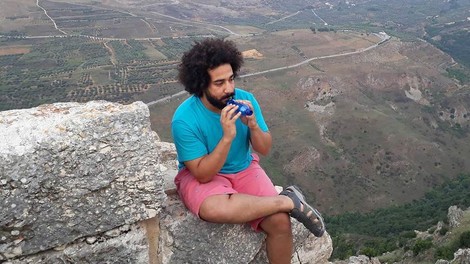Your podcast discovery platform
Curious minds select the most fascinating podcasts from around the world. Discover hand-piqd audio recommendations on your favorite topics.

piqer for: Climate and Environment Globalization and politics Health and Sanity
Mona Silavi is a human and women’s rights activist from the Ahwaz region in Iran. She obtained her bachelor in psychology and specialized in children and adolescence psychology at Damascus University, faculty of psychology and education. She holds a master degree in good governance and human rights in MENA region from Ca’ Foscari University in Venice. She started her activism in Damascus as member of Ahwazi Arab student association. Mona Silavi is a Project Officer at the Unrepresented Nations and Peoples Organization (UNPO) and is the coordinator for topics concerning freedom of religion and belief. She is also a spokesperson of the Al-Ahwaz Democratic Solidarity Party (DSPA). Since 2014 Ms Silavi lives in Belgium as a political refugee
Symphony Of The Future By Child Garbage Collectors
It seems the Middle-East and North Africa have been always on the news, but nothing beyond violence and instability has been circling about this region. In addition, the “lost Arab Spring” is what we hear mostly, which enforces the desperation.
This region, despite all its catastrophes, dictatorships and revolutions, still has hope and young activists who have aspirations for a better future and who act upon these aspirations.
In Arab countries, there is an old saying: “Books are written in Egypt, published in Lebanon and read in Iraq”. It refers to the high numbers of elites in Egypt who shaped the intellectual life in the Arab world, freedom of speech in Lebanon that allowed publication of books freely with no censorship, and finally Iraq, which had until 1991 one of the best educational performances in the region, according to UNESCO.
These three countries are in chaos at the moment. No more freedom of speech in Lebanon nor education in Iraq, but what has not been destroyed is the desire for change among youth in this region.
Shady Rabab is one of these young people from Egypt, a country with 100 million in population. A country that ranks among the first birthplaces of civilization. Now what is left from the most advanced civilization in the world is surrounded by touristic resorts and pollution.
Development policies with no respect for environmental measures, tourism without sufficient infrastructure, poverty, and children having to work as garbage collectors are some of Egypt’s problems.
Shady’s story proves the existence of hope. He teaches children who collect garbage how to play music and, at the same time, he makes musical instruments by recycled garbage. His story is worth reading and supporting as:
Rabab's Garbage Conservatory Project is one of the seven projects that have been selected for Young Champions of the Earth prize designed by the United Nations for young environmentalists. Rabab will pick up the award Sept. 26 in New York.
Stay up to date – with a newsletter from your channel on Climate and Environment.
